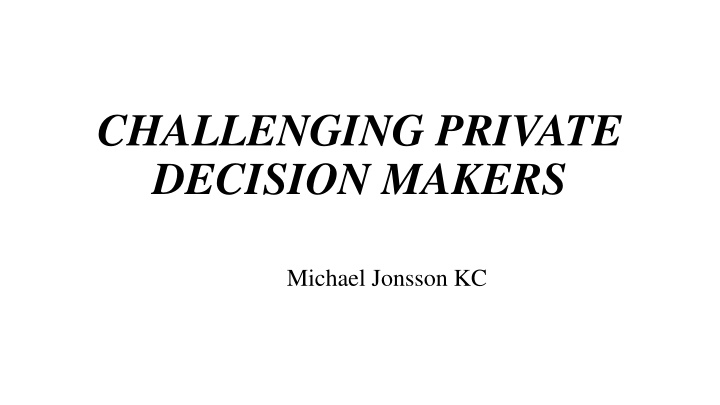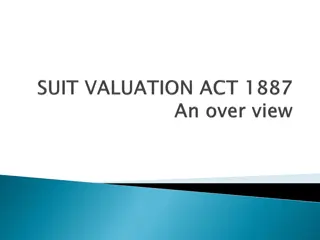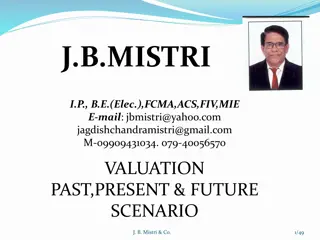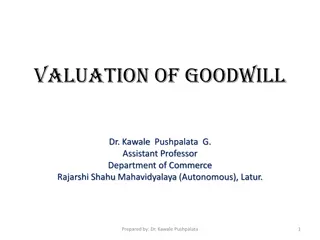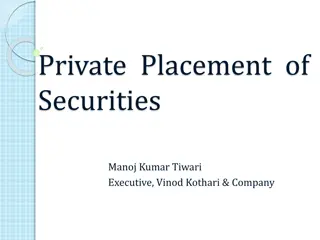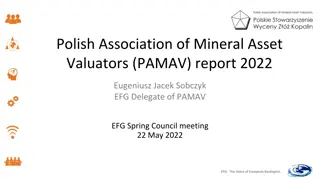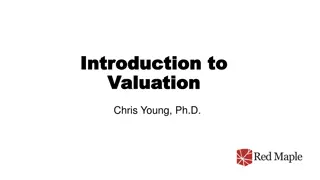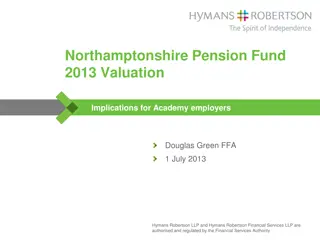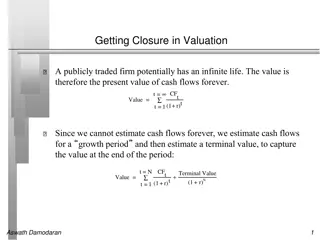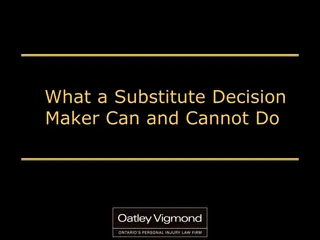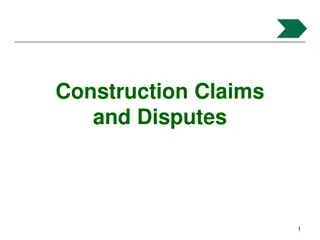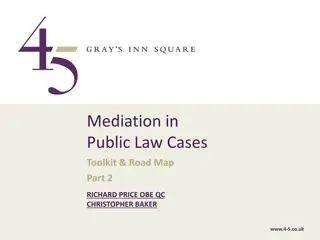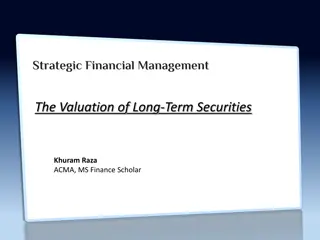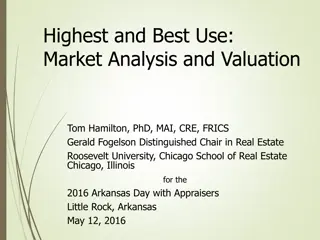Legal Implications of Challenging Private Decision Makers in Valuation Disputes
In the context of challenging private decision makers in valuation disputes, the ability of courts to set aside valuations is examined. The importance of defined criteria in decision-making processes and the history of obstacles in arbitration are discussed. Legal precedents and the role of valuers as experts are analyzed in terms of finality and binding agreements.
Download Presentation

Please find below an Image/Link to download the presentation.
The content on the website is provided AS IS for your information and personal use only. It may not be sold, licensed, or shared on other websites without obtaining consent from the author.If you encounter any issues during the download, it is possible that the publisher has removed the file from their server.
You are allowed to download the files provided on this website for personal or commercial use, subject to the condition that they are used lawfully. All files are the property of their respective owners.
The content on the website is provided AS IS for your information and personal use only. It may not be sold, licensed, or shared on other websites without obtaining consent from the author.
E N D
Presentation Transcript
CHALLENGING PRIVATE DECISION MAKERS Michael Jonsson KC
Is the mistake of a kind which enables the court to set aside the valuation ? In my opinion it is not of the relevant kind. There is nothing in the contract which would enable the valuation to be set aside on the simple ground that the valuer made a mistake. Nor do I think it possible to imply a term to that effect The rent review clause makes the decision of the valuer final and binding on the parties to this lease . Nothing in the lease suggests that it was not to be final and binding if it was the result of error or mistake or was unreasonable. The decision whatever it is is to bind the parties. It is true that the valuer is acting as an expert not as an arbitrator . But those words which have commonly been used in agreements since the Common Law Procedure Act 1854 serve the purpose of excluding the provisions of the Arbitration Act 1902. They avoid the necessity for the valuer to hear evidence and the parties and to determine judicially between them. They enable him to rely on his own investigations, skill and judgment Indeed they reinforce the view that the parties, as between themselves, rely on the honest and impartial skill and judgment of the valuer. [supportive references omitted] Legal & General Life of Australia Ltd v A Hudson Pty Ltd (1985) 1 NSWLR 314, at 336
My Lords, I know that there has been a very great inclination in the courts for a good many years to throw obstacles in the way of arbitration. Now, I wish to speak with great respect of my predecessors the judges; but I must let your Lordships into the secret of that tendency. My Lords, there is no disguising the fact, that as formerly the emoluments of the judges depended mainly or almost entirely of fees, and they had no fixed salary, there was great competition to get as much as possible of litigation into Westminster Hall, and a great scramble in Westminster Hall for the division of the spoil [a]nd they had great jealousy of arbitrations, whereby Westminster Hall was robbed of those cases which came neither into the [Kings Bench], nor the [Common Pleas], nor the [Exchequer]. Therefore, they said that the courts ought not to be ousted of their jurisdiction, and that it was contrary to the policy of the law. Scott v Avery (1857) 28 LT 207 Curiously, this passage was not reported in other contemporaneous reports of this important decision.
A dispute is not capable of decision in a judicial manner absent the existence of certain objective criteria which define how a decision for its resolution is to be reached. If the decision maker is free to apply his or her idiosyncratic view the decision making process cannot in substance be a judicial one. It is only if the decision maker is bound by certain measures, standards or criteria, which are known to the parties, that the process can resemble a judicial one. An arbitration requires the existence of a dispute which is to be resolved according to such defined criteria. In the application of those criteria, there could be more than one answer, such as more than one revised price. Yet that is no different from where, for example, the application of the relevant statute and common law can result in a range of proper awards of damages. Xstrata Queensland Ltd v Santos Ltd [2005] QSC 323 at [29].
AFCA[Australian Financial Complaints Authority] is a company limited by guarantee and is the operator of the AFCAscheme , which is a financial services external dispute resolution scheme authorised under s 1050 of the Corporations Act 2001 (Cth) (the Act). Pursuant to s.912A(1)(g)(i) of the Act, a financial services licensee that provides financial services to persons as retail clients is required to have a dispute resolution system complying with s.912A(2) of the Act, which relevantly requires membership of the AFCA scheme. AFCA s Constitution cl 3.2(g) provides that each member of AFCA agrees to be bound by the AFCA Complaint Resolution Scheme Rules (AFCA Rules). Once a complaint is made to AFCA, the AFCA rules form a binding tripartite contract between the complainant, AFCA and the member the subject of the complaint (referred to in the Rules as the financialfirm ) ... A determination by AFCA is not susceptible to judicial review. AFCA s jurisdiction, powers and obligations are governed solely by the contract set out in the AFCA Rules; and any challenge to a determination by AFCA depends largely on whether the determination was made in accordance with the terms of that contract Australian Capital Financial Management Pty Ltd v Australian Financial Complaints Authority [2021] NSWSC 1577, at [2] to [4]
[Where:] A and B contract with each other to confer a discretion on A, that does not render B subject to A s uninhibited whim the authorities show that not only must the discretion be exercised honestly and in good faith, but, having regard to the provisions of the contract by which it is conferred, it must not be exercised arbitrarily, capriciously, or unreasonably. That entails a proper consideration of the matter after making any necessary enquiries. Abu Dhabi National Tanker Co v Product Star Shipping Ltd [1993] 1 Lloyd s Rep 397, at [404]
By referring the decision to [an expert decision maker], the parties agree to accept his honest and impartial decision They rely on his skill and judgment and agree to be bound by his decision [A]s between the parties to the main agreement, the [decision] can stand even though it was made negligently. While mistake or error on the part of the [expert decision maker] is not by itself sufficient to invalidate the decision nevertheless, the mistake may be of a kind which shows that the valuation is not in accordance with the contract In each case the critical question must always be: Was the [decision] made in accordance with the contract ? If it is, it is nothing to the point that the [decision] might have proceeded on the basis of error The question is not whether there is an error in the discretionary judgment of the [expert decision maker]. It is whether the valuation complies with the terms of the contract. Legal & General Life of Australia Ltd v A Hudson Pty Ltd (1985) 1 NSWLR 314, at 335-336.
Generally, the contract concerned will provide detailed fixed and objective criteria as to how the value of amounts to be certified under interim and final certificates is to be determined. These fixed and objective criteria are usually in the form of detailed schedules of rates or bills of quantities or specifications. The criteria so laid down enable the certifier, when assessing the value of the work and the amount of the certificate concerned, merely to measure an item of work, assess its quality, and apply the rate provided by the contract for that item. In this sense, the valuer does not exercise a discretionary judgment in valuing the work. It is a mechanical exercise. WMC Resources Ltd v Leighton Contractors Pty Ltd (1999) 20 WAR 489, at 494. - as compared to - decisions where no fixed or readily available standard criteria exist. There may be several possible methods of assessing value, each giving widely different results, but each being reasonable. Many subsidiary factors relevant to the valuation may be uncertain, many contingencies may have to be taken into account, wide ranges of legitimate decisions may apply, and opinions may legitimately differ as to virtually all of the relevant issues. WMC Resources, at 496.
question, not of principle or of positive findings of fact or law, but of proportion, of balance and relative emphasis, and of weighing different considerations. It involves an individual choice or discretion, as to which there may well be differences of opinion by different minds: British Fame (Owners) v Macgregor (Owners) [1943] A.C. 197 at 201. Such a finding, if made by a judge, is not lightly reviewed Podrebersek v Australian Iron & Steel Pty Ltd (1985) 59 ALJR 492, 494.
The line is not drawn by reference to whether the primary judges process of reasoning to reach a conclusion can be characterised as evaluative or is on a topic on which judicial minds might reasonably differ. The line is drawn by reference to whether the legal criterion applied or purportedly applied by the primary judge to reach the conclusion demands a unique outcome, in which case the correctness standard applies, or tolerates a range of outcomes, in which case the House v The King standard applies. The resultant line is not bright; but it is tolerably clear and workable Minister for Immigration v SZVFW (2018) 264 CLR 541, at 563.
What is error in any given case depends, of course, not only on the evidence, but also on the nature of the findings or conclusions made by the primary judge. The demonstration of error may not be straight- forward where findings or conclusions involve elements of fact, degree, opinion or judgment or when the findings or conclusions in question can be seen as made with the advantage of hearing the evidence in its entirety, presented as it unfolded at the hearing with the opportunity over the course of the hearing and adjournments for reflection and mature contemporaneous consideration and assessment This is not to elevate ordinary factual findings to the protected position of those based on credit, but it is to make clear, first, the advantages of the trial judge and, secondly, the need for demonstration of error. The inability to identify error may arise in part from the unwillingness of the appeal court to be persuaded that it is in as good a position as the trial judge to deal with the issues, because of the kinds of considerations referred to above. Or, it may be that the nature of the issue is one such that (though not a discretion) there cannot truly be said to be truly one correct answer. In such cases the availability of a different view, indeed even perhaps the preference of the appeal court for a different view, may not be alone sufficient In circumstances where, by the nature of the fact or conclusion, only one view is (at least legally) possible (for example, the proper construction of a statute or a clause in a contract, where, although, as often said, minds might differ about such matters of construction, there can be but one correct meaning ) the preference of the appeal court for one view would carry with it the conclusion of error. However, other findings and conclusions may be far more easily open to legitimate differences of opinion [supporting citations omitted my emboldened emphasis] Costa v Public Trustee of New South Wales [2008] NSWCA 223, at [24] and [25].
The word reasonable has often been declared to mean reasonable in all the circumstances of the case. The real question, in my opinion, is to determine what circumstances are relevant. In determining this question regard must be paid to the nature of the transaction. A circumstance which had no relation to the property which was the subject matter of the transaction but which depended entirely upon the personal position or personal desires of the owner of the property, would not, in my opinion, be a relevant circumstance in determining what was reasonable. Opera House Investment Pty Ltd v Devon Buildings Pty Ltd(1936) 55 CLR 110, at 116
administrative law provides a useful analogy in the present context. There, the decision maker has an area within which he or she may make mistakes, even mistakes or relevance or law, without failure to exercise the jurisdiction conferred, or exposing the decision to quashing. It is only those mistakes which involve a failure to address something which the statute requires to be taken into account that will expose the decision to judicial review on jurisdictional grounds Holt v Cox (1997) 23 ACSR 590 at 597.
The situation is analogous to that which faces a court in a cases of judicial review of administrative error. Just as an administrative decision maker has an area within which he or she may make mistakes without relevant consequence, so too an expert appointed under contract has an area within which the contract contemplates that he or she may make mistakes without relevant consequence. Similarly, just as there are some administrative mistakes which amount to jurisdictional error, and so expose a decision to judicial review, those appointed under contracts to make determinations may make errors which are beyond the area of tolerance which it is to be supposed the contract had in view. AGL Victoria Pty Ltd v SPI Networks (Gas) Pty Ltd[2006] VSCA 173, [52]
One must not in a contractual context like this slip into the language or methods of judicial review. The court is not concerned here with an act or decision in excess of a statutory power or duty, but with the question whether an opinion conforms to the requirements of the contract McArthur v Mercantile Mutual Life Insurance Co Ltd [2001] QCA 317, at [10]
the trend in recent years has been influenced by a recognition that courts have no greater expertise than expert valuers; and that where parties have chosen voluntarily to commit the determination of valuation to an expert, judicial restraint is an appropriate response. Holt v Cox (1997) 23 ACSR 590, at 596
As can be seen the primary judge concluded that the lessee did not provide the expert with post-natural disaster production figure If the primary judge was correct on either or both of the issues dealt with by him then the appeal will be unsuccessful. If, on the other hand, it is concluded that the decision of the expert is reviewable and the primary judge was in error in concluding that the expert s determination was correct, then the matter can be remitted to the expert for determination in accordance with the reasons of the Court. I would make the following orders: (1) Appeal allowed. (2) Orders 1-3 made by the primary Judge be set aside. (3) Order that the matter be remitted to the Second Respondent [the expert decision maker] for determination in accordance with these reasons Australian Vintage Limited v Belvino Investments No 2 Pty Ltd [2015] NSWCA 275, at [31], and orders pronounced
